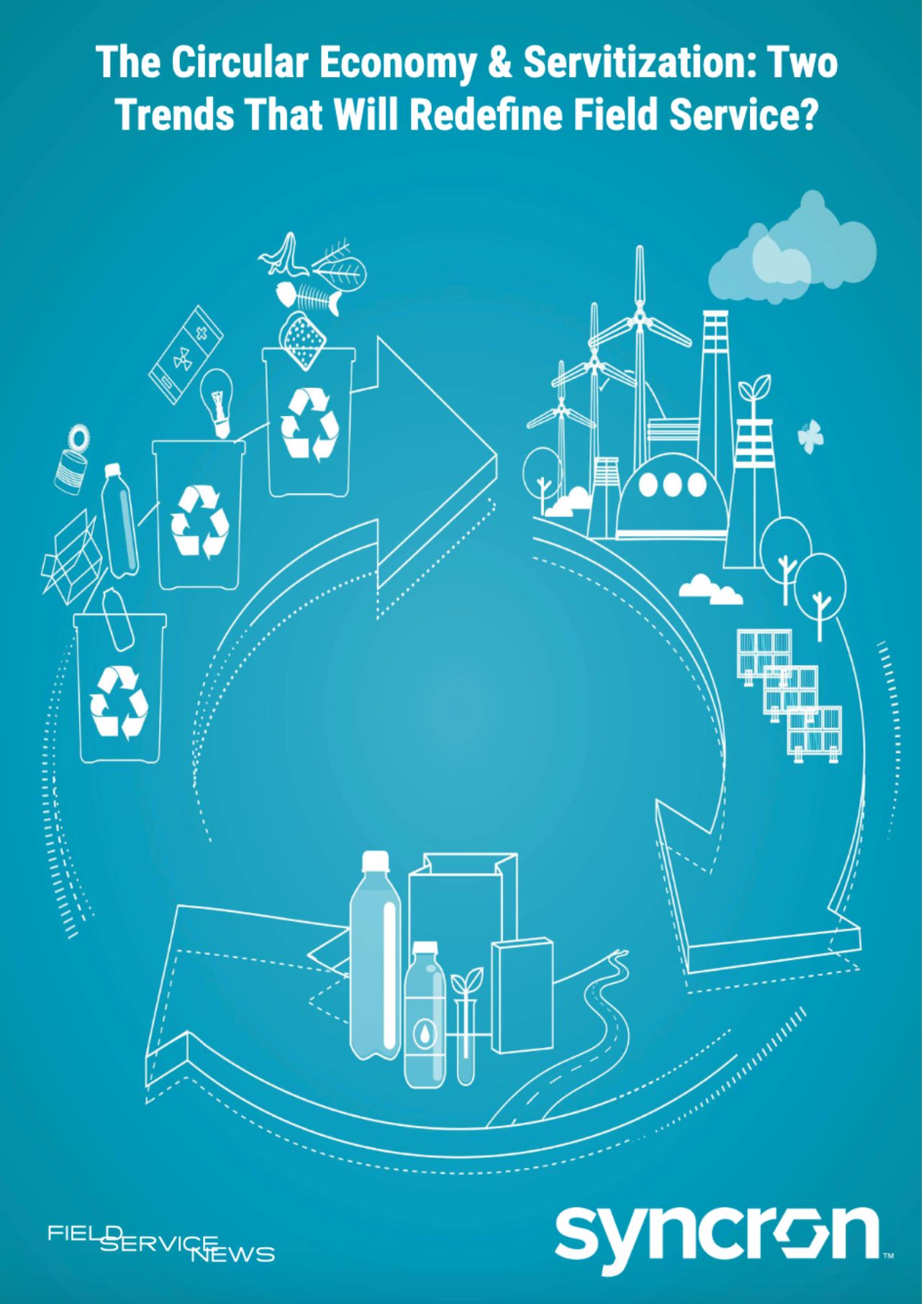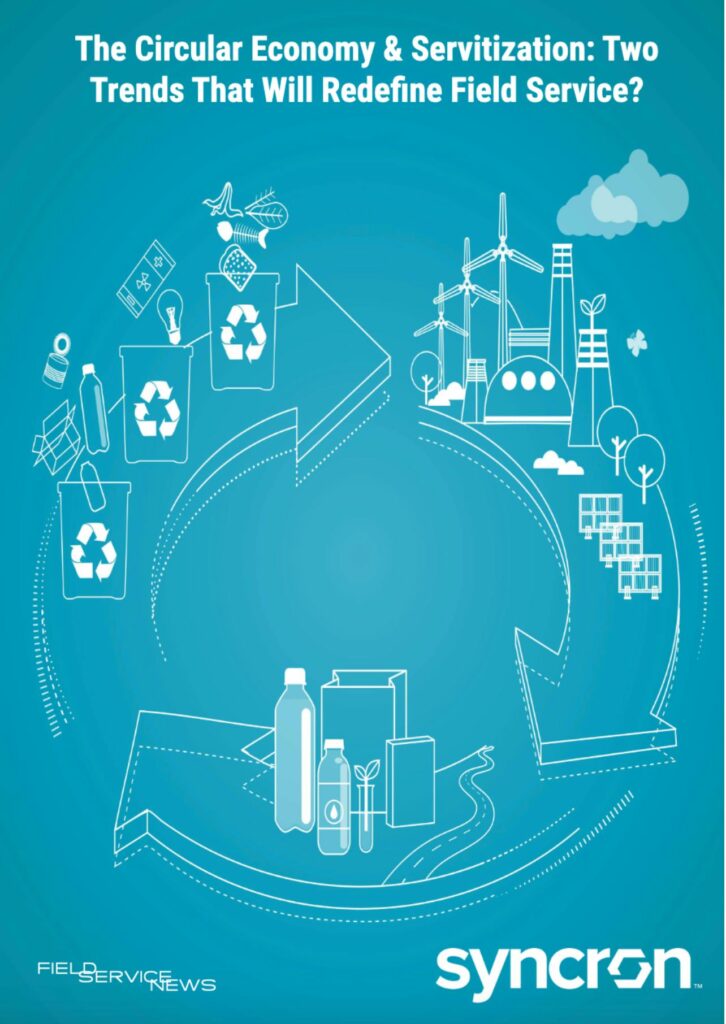Revolutionizing Field Service Management with Circular Economy and Servitization Practices
Revolutionizing Field Service Management with Circular Economy and Servitization Practices
As a senior field service management professional, you know that providing excellent customer service while managing costs and resources is vital to business success.
Additionally, in today’s world, this also means considering the impact of your business on the environment and adopting sustainable practices wherever possible. In field service, these two overarching trends are most visible in discussions around servitization and the circular economy.
What is particularly interesting, however, is how closely these two concepts align.
Defining the Circular Economy and Servitization
While servitization and the circular economy are terms you are likely already familiar with as a field service management professional, let us take a moment to define these terms so we have a shared understanding across this paper.
The circular economy is an economic model that aims to keep resources in use for as long as possible, reducing waste and optimizing resource use. Rather than the traditional linear take-make-dispose model, the circular economy seeks to create a closed-loop system where resources are used through repair, reuse, and recycling. This can involve designing products for repair and disassembly, encouraging consumers to repair and maintain their products, and creating new revenue streams through recycling and upcycling.
On the other hand, servitization is a business strategy that involves offering a combination of products and services to provide outcome-based solutions for customers. Instead of simply selling products, companies provide ongoing services and solutions that support their customers’ needs. This includes everything from maintenance and repair services to training, consulting, and financing. By offering services and solutions that deliver specific outcomes, companies can build stronger customer relationships, generate new revenue streams, and reduce their environmental impact.
Adopting Circular Economy and Servitization Practices
By adopting circular economy and servitization practices, field service organizations can extend the lifespan of their products, reduce waste, and generate new revenue streams through innovative business models.
Reducing Waste and Generating New Revenue Streams
For example, an industrial machinery manufacturer could implement servitization by offering machinery services and selling machinery. Rather than simply selling machines and leaving customers to maintain and repair them on their own, the manufacturer could provide ongoing maintenance and repair services and leasing or renting machinery to customers.
By offering these services and solutions, the manufacturer can not only reduce its environmental impact by extending the lifespan of its products but also generate new revenue streams through service contracts, leasing, and renting.


Data usage note: By accessing this content you consent to the contact details submitted when you registered as a subscriber to fieldservicenews.com to be shared with the listed sponsor of this premium content Syncron who may contact you for legitimate business reasons to discuss the content of this briefing report.
This content is available for FSN PRO members and also for a limited period for FSN FREE members. Please make sure you are logged in to access this content.
Not yet subscribed? Instantly unlock this content and more on our forever-free subscription tier FSN FREE
Join FSN FREE today!
Subscribe to our forever-free subscription tier FSN FREE by completing the brief form below and get instant access to this resource plus a selection of premium resources every month.
[pmpro_signup submit_button=”Get access now!” level=”1″ redirect=”referrer” custom_fields=”true” short=”true”]
Some browsers may not support our quick-register pop up function. If you cannot see a red button above this message then click here to head to the FSN FREE registration page instead.
"By adopting circular economy and servitization practices, companies can reduce their environmental impact, generate new revenue streams, and build stronger customer relationships. However, there are also challenges to implementing these practices, including the need for new skills and capabilities, changes in business models, and the need for new partnerships and collaborations......”
Creating More Sustainable Business Models
In addition to reducing waste and generating new revenue streams, servitization can help companies create more sustainable business models by reducing reliance on resource-intensive manufacturing processes.
By shifting the focus from products to outcomes, companies can rethink their value proposition and find new ways to deliver value to customers while reducing their environmental impact.
Challenges and Opportunities for Field Service Organizations
Combining the circular economy and servitization offers exciting opportunities for field service management professionals to create more sustainable and profitable business models.
By adopting circular economy and servitization practices, companies can reduce their environmental impact, generate new revenue streams, and build stronger customer relationships.
However, there are also challenges to implementing these practices, including the need for new skills and capabilities, changes in business models, and the need for new partnerships and collaborations.
Then there is the particularly thorny question of what these trends will mean for spare parts revenue, which in many cases makes up the lion’s share of service revenue.
The Purpose of this Paper
This paper, which is now available to our subscribers, will explore the relationship between the circular economy and servitization and analyze the practical implications of these concepts for field service management professionals. We will take a closer look at the principles of the circular economy and servitization and provide examples of companies that have successfully implemented servitization in a circular economy context.
However, this is not a straightforward path for field service organizations, so we shall also discuss the challenges and opportunities for field service organizations to adopt circular economy and servitization practices.
By the end of the paper, we hope to give you, as a field service management professional, a better understanding of the impact of the circular economy and servitization practices on field service operations and to help you be better positioned to develop sustainable business models that benefit both their bottom line and the planet.
However, the journey for each organization is, of course, different. So rather than try to provide you with magic bullet answers in the conclusion, we shall instead provide you with a series of reflective questions to help you start establishing a better understanding of how these trends will impact your field service organization and how you can begin developing practical plans to adapt.
We hope you find this paper of use on this critical topic. Download it today at the link below.

Do you want to know more?
If you are already a subscriber you can access the report instantly on the ‘read now’ button below. If the button is not showing and you are already a subscriber then please log-in and refresh this page.
Not yet subscribed? Instantly unlock this content and more on our forever-free subscription tier FSN FREE
Join FSN FREE today!
Subscribe to our forever-free subscription tier FSN FREE by completing the brief form below and get instant access to this resource plus a selection of premium resources every month.
[pmpro_signup submit_button=”Get access now!” level=”1″ redirect=”referrer” custom_fields=”true” short=”true”]
Some browsers may not support our quick-register pop up function. If you cannot see a red button above this message then click here to head to the FSN FREE registration page instead.

 Data usage note: By accessing this content you consent to the contact details submitted when you registered as a subscriber to fieldservicenews.com to be shared with the listed sponsor of this premium content Syncron who may contact you for legitimate business reasons to discuss the content of this briefing report.
Data usage note: By accessing this content you consent to the contact details submitted when you registered as a subscriber to fieldservicenews.com to be shared with the listed sponsor of this premium content Syncron who may contact you for legitimate business reasons to discuss the content of this briefing report.


